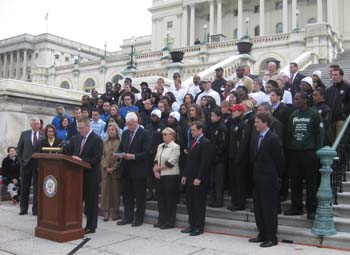 |
 |
| current issue |  | past issues |  | send a letter/news |  | address update |  | advertise |  | about us |  | alumni home |
Features
After War, LifePage 5 of 5
 Survivor Corps Photo CAPITOL STEPS: In 2009, Quilty speaks in favor of the GIVE Act, which created a Veterans Service Corps. |
Not every veteran is a Mensa member like Quilty, and maybe not every vet has his knack for rallying the team to tackle tough challenges. But Mitchell, who hopes to hire more veterans, urges other employers to give them a chance. "If there is an aspect of your business that could benefit from unrelenting drive, focus and teamwork," he says, "taking a chance on a veteran is a no-brainer."
Back in the yard on that August Sunday, Quilty is talking about a bike race he just did with a group from work. Though he never thought he would, he has also returned to rock climbing. He demonstrates, using the child-sized climbing wall on the swingset. "In some ways it's better than a real leg," he says, moving his prosthetic into place. "Even when my left calf is burning, my right one never gets tired."
People see different things when they look at Quilty. Strangers in airports say, "Thank you for your service" and offer to buy him drinks. TSA agents search him extra thoroughly, then apologize. In business, when he's wearing a suit, nobody looks twice—until a new client wants to shake hands. If he goes to a store in shorts, "it's like Moses parting the Red Sea," he says. "Everybody looks." One day, wearing shorts and T-shirt at the gym, he watched a woman trying to keep her daughter from staring. "But Mommy," the little girl said loudly, "it's a robot!"
|
CNN interview with Scott Quilty Readers Digest video of Scott Quilty Scott Quilty testifying on behalf of the GIVE Act on the Capitol steps |
At home, nobody stares or cuts him a break. If Quilty gets up and starts making breakfast without attaching his arm, Mackenzie brings it to him with her version of a sentence: "Daddy arm." At 3, Ian is more aware of differences. On Quilty's desk sits an art project Ian brought home from church. "It's you, Daddy," he said. The paper-bag man has no right arm or leg.
Scott and Dora figure Ian will talk about the paper-bag man when he's ready. Recent years have built their reserves of patience and strength. When those falter, Dora looks at the blue cross tattooed above her ankle, a reminder that her faith supports her.
Scott relies on what he learned in the service, and the perspective he gained by leaving it. If a child is having a meltdown or a client is dissatisfied, he'll get caught up in it briefly. Then he'll mentally demote that worry to a lower rank in life's platoon of troubles. He looks to the wall near his desk, to a large framed photo of Ben Keating in the mountains of Afghanistan. Putting it there marked a milestone on his road from war to life.
Back in the rehab days, once he'd begun to feel steadier and to catch glimpses of a path ahead, Quilty went to Keating's hometown in Maine, to see his grave and visit his parents. He began to make peace with the ungraspable: He had survived, and Keating—"in so many ways, the best of us"—had not. Scott and Dora named their son for their friend: Ian Benjamin.
Even after they'd settled into the house, Scott didn't open the trunk containing his military mementoes. You can't lock it all away, Dora argued, and slowly he started to see what she meant. The Army shaped them. They're proud of their service and don't regret a moment of it, not even the worst moments.
So today as he works, Quilty can look around his office at a folded flag, a card signed by his platoon, and the picture of Keating. "I'm reminded by that picture what a privilege it is just to be here," he says. "I can't waste a single moment. Ben didn't get a chance at these moments, and it's disrespectful to his memory to do anything else but live." ~
Jane Harrigan was a UNH professor of journalism for 23 years and is now a freelance editor and writer.
Page: < Previous 1 2 3 4 5
Easy to print version
blog comments powered by Disqus

